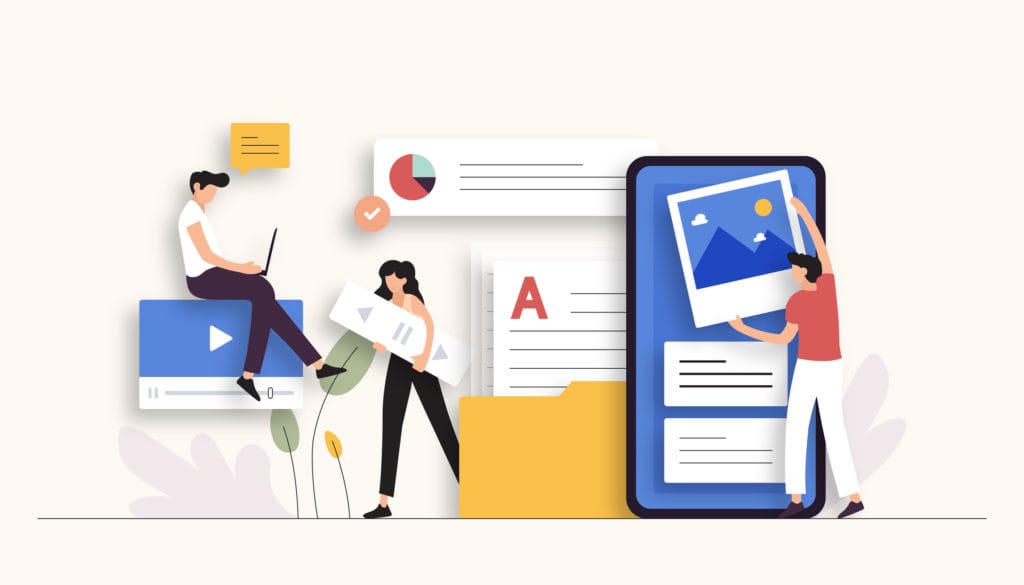For years, there’s been a debate on duplicate content – what qualifies as duplicate, and what it means for your search engine ranking. The conventional wisdom has been that when your website has duplicate content, its ranking is penalized as a result.
But as of January 2021, we finally have clarification from Google, through John Mueller. It’s something he discusses the topic in Google Search Central SEO office hours, in the episode on January 29, 2021.
It’s official: having the same content across multiple pages isn’t something that will cause you to rank lower. Google knows it’s normal for sites to have a certain amount of duplicate content – and the algorithms are designed to handle it.
Overview
Duplicate Content
In the old days of SEO, duplicate content was one of the most common SEO mistakes you could make on your site. However, things have changed over the years. Still, if entire pieces of content are duplicated, Google will rank one and not show any others. Multiple copies of the same page will not send negative ranking signals. In general, Google will rank the first to publish the content instead of those who steal, copy, or scrape.
That said, duplicate pages can eat up the crawl budget and bloat your site, but that’s a separate topic that Mueller doesn’t address in his answer.
Sections of Contentm
If there are sections of content, like the content found in the header or footer of a website, it won’t cause negative ranking signals.
Mueller says:
“With that kind of duplicate content, it’s not so much that there’s a negative score associated with it. It’s more that, if we find exactly the same information on multiple pages on the web and someone searches specifically for that piece of information, then we’ll try to find the best matching page.
So if you have the same content on multiple pages then we won’t show all of these pages. We’ll try to pick one of them and show that. So it’s not that there’s any negative signal associated with that. In a lot of cases, that’s kind of normal that you have some amount of shared content across some of the pages.”
Duplicate Content is More Common Than You Think
Think about online shopping. How many retailers are out there selling the same products? The product pages are likely to share a great deal of the same content. Google won’t send negative signals because it crawled a product description that also appears on another retailer’s website.
Technically speaking, your website footer is duplicate content. But, it’s not an issue because Google is built to deal with that.
Normal Duplicate Content vs. Malicious Duplicate Content
If you need more clarification about creating duplicate content, take a look at this documentation in Google Search Central.
Non-Malicious Duplicate Content
- Items in an online store shown or linked to by multiple distinct URLs
- Printer-only versions of webpages
- Discussion forums that create regular pages and stripped-down versions for mobile.
If your site has multiple pages with a lot of identical content, you can use canonicalization to indicate the URL you’d prefer Google to use.
Duplicate content that could negatively affect your ranking generally happens when you’re using deceptive practices to manipulate rankings or traffic. If for instance, you duplicate content deliberately across multiple domains, you’re in trouble. It’s not only against Google’s terms and conditions, it creates a poor user experience because a visitor essentially sees the same content repeated throughout the search results.
To address duplicate content issues on your website, make sure to use 301 redirects any time you restructure your website. This redirects users, along with Googlebot and other spiders from the old page that’s shown in the search results to the equivalent content at the new address.
You should also be consistent with your internal linking practices. If you’re linking to http://www.example.com/page/ then don’t link to http://www.example.com/page and http://www.example.com/page/index.htm.
If you want to ensure Google servers the most appropriate version of a document, use top-level domains whenever possible. The bot is more likely to understand that http://www.example.de contains German-focused content than the same content presented at either http://example.com/de or http://de.example.com.
Pay attention when you syndicate content. If you share your content on other sites, Google will always show the version it thinks is most appropriate for the user, which may or may not be the one you want. Ensure each site where your content is syndicated should include a link back to your original article. Though you can ask the site where you’ve syndicated your content to use the noindex tag so Google won’t index their version, you cannot count on them honoring your request.
Instead of using placeholders, don’t publish anything you don’t have real content for yet. If you need to use placeholders, use the noindex tag on the page until you’re ready for them to be searchable.
Google makes it clear that duplicate content on your site isn’t grounds for negative action against the site unless the intent seems to be deceptive or manipulative.
If your site has duplicate content issues and you don’t take any of the above steps to address the issue, Google will choose a version of the content to show in the search results.
But, if in the course of the review to decide the version of the content to display, Google discovers deception or manipulation, it is entirely possible to have it removed from the search results. If this happens to you, it’s crucial to review all the webmaster guidelines for more information. Make changes and when you believe your site is no longer violating guidelines, submit for reconsideration.
Though rare, it’s possible the algorithm will choose a URL from an external site hosting your content without your permission. If this is the case, contact the site’s host to request content removal. You can also request that Google removing the page from the search results with a request under the Digital Millennium Copyright Act.
Worried about duplicate content issues with your site? Contact us today for a free consultation. Our team can audit your site and generate a list of recommendations for you.
Contact us today to get the conversation started!










